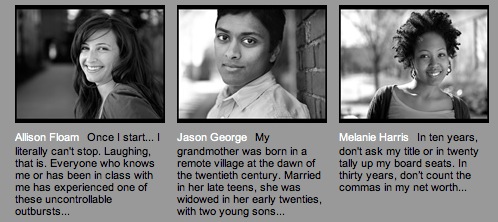Part of the holy grail of a good application to business school is to show why the particular nature of the b-school you are applying to fits with you and what you want out of your MBA. That is, each program has a slightly different ‘signature’ in terms of curriculum, type of students, faculty interest, clubs and extramurals, internship-recruitment opportunities, alumni network and so on, and the task is to show that you understand what that signature is and why it fits with you.
You won’t get a lot of help from looking at the glossy brochure or the school’s glamor Website. That won’t make you enough of an ‘insider.’ The only way to know enough about a program is to get inside it for a while — by interacting with people who are there, or visiting the campus and talking to people who are there.
Social media networking forums have created new options for doing this. You can connect with or ‘follow’ current students or clubs via their blogs or tweets, or their identities Facebook, LinkedIn, etc. If there is a Stanford club entertaining Steve Jobs, it will be on someone’s blog. If Wharton students are on a trek, someone will have uploaded video to YouTube, and so on. Following this assiduously and interacting (politely) where appropriate will give you a window into the nature and culture of the program you are targeting in a way that just was impossible to imagine a few years ago. Beware, quality is mixed to say the least. You will get many perspectives from parties with vested interests that are not aligned with yours. Use them wisely. But overall this is the way to go.
Some admissions officers blog too, and currently Adcoms in general are rapidly revamping their own marketing (seeking to find and attract great applicants) to include social media. More and more authentic and useful insight in each school from the school itself is being offered in this way. See, for example, Chicago Booth Adcom director Rose Martinelli’s very personable blog, The Rose Report. You can follow, interact, and absorb the school’s culture in this way. (Again, be appropriate. Don’t, for example, use a blog comment facility to ask about your own personal application…)
But the downside of social media is this: If you can find and know them in this way, they can find you. Be careful about what you say online and what you have said. I’m not saying that Adcoms “google” an applicant or routinely look them up on identity sites to find out more about them or corroborate what they put down on the forms. They probably don’t. But they very well might.
Expect Adcom to treat you in some ways like a potential employee or client. It’s well known that these days prospective employers or prospective clients, or anyone who wants to look you up on the Web, can and will do so. And when they do they may find that beery and not-altogether-clean bachelor party photo on MySpace. Or they may find a Doostang profile that doesn’t adequately match what you’ve told them. And it’s quite hard, once something is out there on the Web, to take it back.
So be smart about it. Use social networking to get inside a program to research and develop your ‘fit’ argument. Be scrupulous about what is out there under your name, make it consistent with your application platform, and try to take down unprofessional material where you can.

